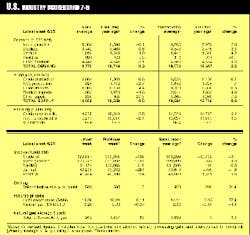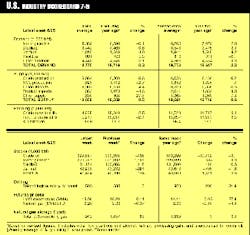OGJ Newsletter
U.S. INDUSTRY SCOREBOARD 7/5
With the benchmark U.S. oil price nearing the $20/bbl mark, the petroleum industry`s faith that the price recovery is sustainable is growing.
In New York trading, Nymex crude for August delivery closed at $19.29/bbl on June 30. By mid-morning July 1, it had reached $19.33/bbl. In London, August-delivery Brent rose 72¢/bbl on June 30 to reach $17.51/bbl.
Continuing strength in oil and gas prices is causing more companies to add their names to the list of those planning to raise 1999 capital budgets (OGJ, June 28, 1999, Newsletter). Coastal increased its planned E&P outlays for the year to $880 million from $590 million. The move is a direct result of strengthening natural gas prices, says Chairman David Arledge. Of the total, $190 million is earmarked for acquisitions and $100 million for drilling and workovers. Cabot Oil & Gas CEO Ray Seegmiller told attendees at the Banc of America Securities energy conference in Houston last week that Cabot has raised drilling spending to $55 million from $44 million in the last few months. Apache and Anadarko say they, too, have tentative plans in place to boost expenditures, according to a Reuters report, while Enron Oil & Gas says it has already hiked its budget slightly.
A majority of Canadian oil companies are cautiously optimistic about the recovery, and 43% plan to increase 1999 capital spending, according to an Arthur Andersen survey of Canadian producers. The study showed 69% of companies cut 1999 spending from 1998 levels because of depressed commodity prices, and 57% have no plans to increase spending, despite the improvement in prices. Arthur Andersen said the price slump was a sustained shock for many companies, and it will be some time before higher prices translate into increased cash flow and more equity enters the market.
Almost all companies surveyed say their major focus will be on natural gas over the next 3 years, with only 4% planning to focus primarily on oil. Companies are more optimistic about gas because of a strong continental market and improved pipeline access to U.S. export markets. And several large natural gas discoveries in Canada`s northern areas have increased industry interest there.
U.S. independent producers` petition asking U.S. government agencies to take action against key exporters of oil to the U.S. may have backfired (see story, p. 33). Mexican Energy Minister Luis Tellez announced that, until the petition to apply a countervailing duty on Mexican crude oil is resolved in Mexico`s favor, Mexico will not eliminate the tariff on natural gas imports on July 1, as it had promised (OGJ, May 31, 1999, Newsletter). Meanwhile, Mexico`s new LPG regulations have been fashioned (OGJ, May 24, 1999, Newsletter). The scheme allows for open imports by private parties, effectively ending Pemex`s monopoly on LPG imports. Private investment is proposed for LPG storage, but it is not yet clear whether this includes foreign investors.
China is taking another leap into the realm of capitalism by planning a major offering of China National Petroleum Corp. stock on one or more foreign stock exchanges. The state oil giant may offer as much as $10 billion worth of its shares in New York, London, and Hong Kong by the end of the year. The assets to be included are being evaluated and may exclude core operations.
One of the world`s leading oil industry trade associations is taking measures similar to those its members have adopted in recent months. API`s management committee has approved a reorganization that will reduce the association from the $60 million/year, 364-person organization of a year ago to a $40 million, 203-person operation within 2 years.
API will be realigned into three councils: advocacy, research analysis and services, and industry operations. Each will be headed by a vice-president; the divisions will interact with one another in a team-based environment.
Iran has joined the power struggle to provide a new secretary general for OPEC, after Saudi Arabia last week put forward its own candidate (OGJ, June 28, 1999, Newsletter). An Iranian oil ministry official told Reuters Tehran has a candidate lined up but didn`t give a name. Press reports have identified Iran`s OPEC governor, Hossein Kazempour Ardebili, however. Election of the secretary general must be by unanimous vote by the 11 OPEC members.
Jordan and Iraq are discussing the possible development of an Iraqi oil field near the border between the two countries, according to local press reports. The work would be done by a joint-venture Jordanian-Iraqi E&D firm set up in 1997. The countries` oil ministers-Jordan`s Sulaiman Abu Alim and Iraq`s Amer Mohammed Rasheed-discussed the field development, along with plans for an export pipeline to Jordan, on which the countries agreed last year. The 750-km, $150 million line would extend from Al Haditha, Iraq, to a refinery at Al Zarqa, Jordan. It would enable Iraq to halt shipments of oil to Jordan by truck.
The Dolphin initiative to develop a massive gas infrastructure around the Persian Gulf took another step forward with the signing of a memorandum of understanding in Abu Dhabi on June 30 between Mobil Oil Qatar and U.A.E. Offsets Group, or UOG (OGJ, June 21, 1999, p. 30).
UOG is a government-sponsored group putting together the pieces of a growing jigsaw puzzle that will include delivery of gas from Qatar`s supergiant North field via trunk lines to industrial centers in the U.A.E., Oman, and potentially Pakistan. The latest piece of the puzzle was Mobil`s agreement to begin negotiations to supply 300-500 MMcfd of gas to the Dolphin project from existing Mobil interests in North field under a partnership with Qatar General Petroleum Corp. The MOU also gives UOG the option to participate in Mobil`s enhanced gas utilization project in North field. UOG Chairman Amin Badr-El-Din said, "This is a significant milestone in the development of the Dolphin initiative. The Mobil MOU is the first agreement with a global energy major and supports the transformation of Dolphin`s business strategy to business implementation."
Kuwait is considering building a fourth refinery, according to Mohamed al Sarie, director of planning at Kuwait National Oil Co. He says the new refinery would help meet the growing fuel oil needs of the country`s power stations: "We are still looking (at whether) we would use (natural) gas or low-sulfur fuel oil at the new power generating stations. We can`t yet speak of the capacity and cost of the new refinery, because we are still studying the matter and have not yet reached the stage of decision-making."
The California Energy Commission has unanimously approved a report setting the timetable for phase-out of MTBE from the state`s gasoline.
The vote affirms the Jan. 1, 2003, deadline set by Gov. Gray Davis (OGJ, Apr. 5, 1999, p. 39) and, contends the administration, gives California refiners ample time to make major modifications to their plants in order to produce adequate volumes of California reformulated gasoline (RFG) without MTBE.
The report added, however, that the state`s refiners are still faced with uncertainties that limit the time they have to prepare to produce RFG without MTBE. These include the possible removal of the federal minimum oxygen requirement for RFG, the viability of ethanol as an MTBE replacement, and proposed Phase III RFG regulations. It is uncertain whether adequate supplies of ethanol would be available by the 2003 deadline. Ethanol is being assessed as a substitute, but the studies will not be complete until December.
Given the looming, and likely spreading, California MTBE ban, the concerns of Canadian methanol producer Methanex about the future of its key product are growing. Methanex has sold a 500,000 metric ton/year methanol complex at Kitimat, B.C., to Acetex Corp. for $1 (Canadian). Methanex is restructuring because of overcapacity and losses, and, judging from the sales price of the Kitimat plant, it was such a drain on Methanex`s resources that essentially giving it away seems a viable option.
Acetex said Methanex will provide a capped amount of support for operating losses until September 2002 and will keep a half interest in any net operating profits. Acetex has an option to acquire Methanex`s interest. Acetex will use the plant as a captive feed source for its acetic acid plant in Pardies, France.
Meanwhile, Methanex has entered into a second fuel-cell development agreement (OGJ, June 21, 1999, Newsletter). This one is with Northwest Power Systems, a manufacturer of stationary fuel-cell power units, and Norway`s Statoil. The firms will work together "to advance the commercialization prospects for methanol fuel cell systems in the home," said Methanex.
Its first agreement, with Petro-Canada and Ballard Power Systems, was for developing methanol-based fuel cell technology for vehicles.
BP Amoco has drilled what it claims is a world-record extended-reach well at Wytch Farm (see related story, p. 47). The well has a measured depth of 37,001 ft TD and a horizontal displacement of 35,197 ft.
This record surpasses Total Austral`s Cullen Norte No. 1 extended-reach record in Tierra del Fuego, with a measured depth of 36,693 ft TD and a horizontal displacement of 34,728 ft (OGJ, May 17, 1999, p. 51).

